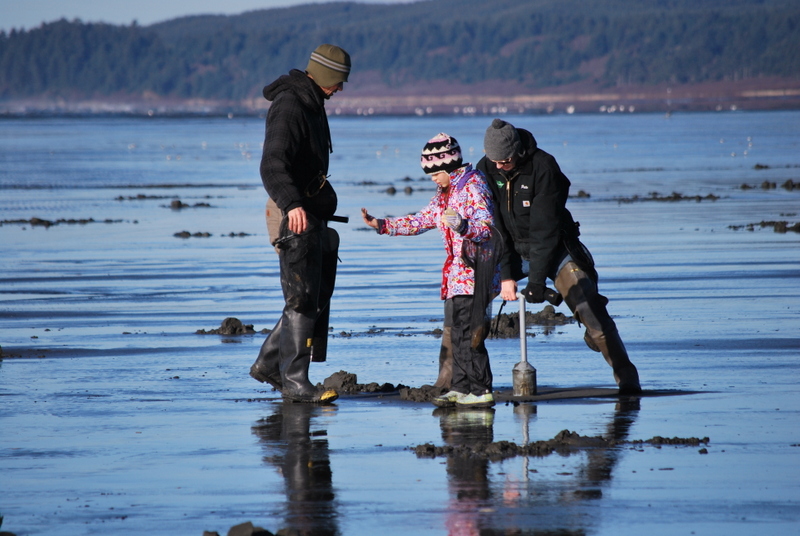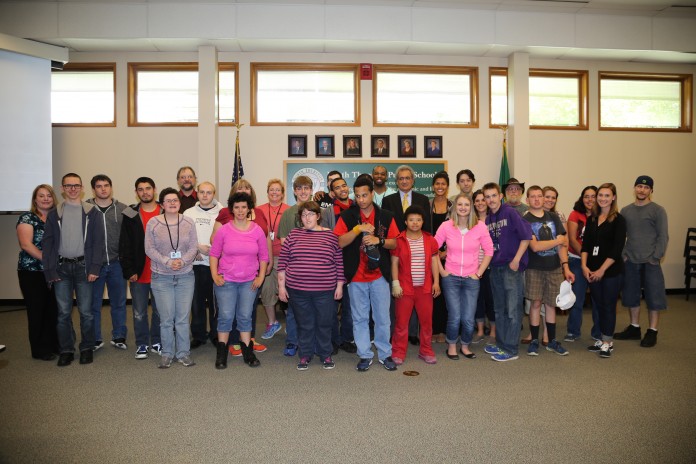By Laurie O’Brien
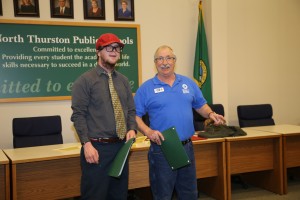
For students with developmental disabilities, creating a life after high school can be difficult. Thankfully public school programs offer transitional programs to help those students into the world of work and to gain a sense of independence they may not have experienced as full time students.
In North Thurston Public Schools, the Vocational Opportunities for Independent Community Employment program (V.O.I.C.E.) is designed for 18-21 year old students who, due to developmental disabilities, require instruction in vocational and life skills. Although they may “walk” in a cap and gown with their peers as a senior, V.O.I.C.E. students do not officially graduate until they receive their diploma at age 21.
All high school graduates, regardless of disability status, face the same challenges: looking for a job, building a resume, figuring out where to live or go to school, negotiating new friendships, and trying to stay connected to friends you’ve known since you were five. V.O.I.C.E. students work with their teachers and a team of para-educators and community employment partners to meet those challenges.
By working with adult agencies like the Department of Vocational Rehabilitation (DVR) the Development Disabilities Administration (DDA) and Morningside, teachers Courtney Glover and Joelle Grun make sure students and their parents or caregivers are aware of the resources available to them as adults. Those particular agencies can help with things like housing and government assistance once students graduate, but the primary goal of the V.O.I.C.E. program is to place students in situations where they can develop job skills in the workplace and where they can continue to interact socially with their peers.
Historically, special education students have been placed in custodial positions or worked as baggers or greeters, but, Glover says, like most young people, her students want to work in fields where their interests lie. “There are a wide variety of skills they have and jobs they’re interested in,” she says. “We just need our name out there so that we can have those community partners and job sites.”
Every year the teachers give interest inventory tests and “try to match (students) with what they like, what their interests are, and what kind of jobs they would like.” Right now the program includes students who have interests ranging from music and horticulture to cars and animals as well as an assortment of other areas.
Graduates of the program and current students are particularly successful at jobs that have well defined objectives and tasks.
For example, at the Lions Eyeglass Recycling Center, job trainees sort, weigh, and clean donated eyeglasses. Those who have the ability may move on to using a special tool to determine the prescription.
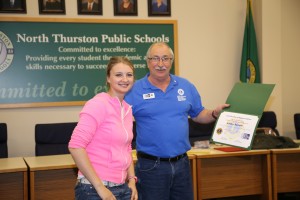
Nature Nurtures Farm and Joint Animal Services involve their job trainees in feeding and watering the animals, cleaning pens and walking dogs.
At local hotels, like the Doubletree, laundry tasks, setting up conference or banquet rooms, and general maintenance like changing lightbulbs or swapping garbage containers is done by student interns.
Any positions offered through community job partners are considered unpaid internships, and students are accompanied by a job coach unless they are able to handle the work independently. “These students really rise to high expectations,” says Libby Thompson, Assistant Director of Special Education for the district. “We have students who are non-academic and maybe even non-verbal, but we get them into a job situation and they just thrive.”
The ultimate goal is for students to develop skills they can add to a resume so they can seek a paying position. Often, they are able to turn an internship into a real job.
Angie Macon’s son, Xavier, graduated from the program last week.
“Last year Xavier (did internships) at Ultimate Fitness, Doubletree Hotel, the Food Co-op, and the bus barn doing the bus wash. This year he’s worked at the Doubletree again and at Roolan Healthcare Center doing laundry.”
This Monday, Xavier reported to his new job. “He did a six week internship at Chiropractic Care Center and they decided to hire him,” says Macon with pride. Xavier now works as a custodian, cleaning the office and doing jobs like paper shredding when the office is on their lunch break. Because he qualifies for supported employment as an adult through the DDA, he continues to have a job coach check in on him periodically.
Xavier travels to his job independently. Learning how to use Intercity Transit is another goal of the V.O.I.C.E. program. “They come here and are immersed in it,” explains Thompson. Part of the role of the job coach is to help students negotiate from their homes and school to job sites and elsewhere in the community.
“The program works so well with little steps,” says Macon. “(Xavier) had a job coach with him when he first started riding the bus, and then they would meet him at each end or at the transit center. He rides the bus independently now. He got on the wrong bus one time but figured it out pretty quickly and called us.”
That sense of independence is crucial. “Riding the bus to the mall to see a movie or meet at a restaurant is key to feeling connected to the community,” says Glover. And it makes it easier for her students to maintain their friendships after high school, too. Every once in a while Glover will have a student who can drive, but for the most part, public transportation is the key to getting and keeping a job as well as a social life.
“Not only does V.O.I.C.E. do the work part, but they do the social piece as well,” says Macon. “This program gave Xavier the feeling that he really could work, that he could have a job, that he can be an adult.”
North Thurston Public Schools’ V.O.I.C.E. program is always looking for additional community work partners. If you’d like to learn more, you can contact either Courtney Glover or Joelle Grun at River Ridge High School during the school year, or you can call the District’s Special Education Office.
2014-15 community-based job sites included:
Fred Meyer
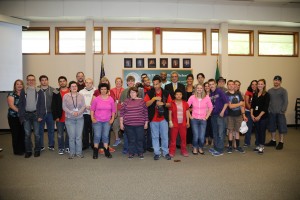
Lions Eyeglass Recycle Center
Thurston County Food Bank
Olympia Food Co-Op
Roolan Healthcare Center
North Thurston Public Schools
Horizons Elementary
Hands On Children’s Museum
Lacey Loves to Read
Services to At-Risk Seniors
Nisqually Middle School
Thurston County Animal Shelter
Nature Nurture Farm
Ultimate Fitness
Ramada Inn
Doubletree Hotel
KOKUA (Residential Support Agency)
Boys & Girls Clubs of Thurston County
Tanglewilde Apartments
Saint Martin’s University






























